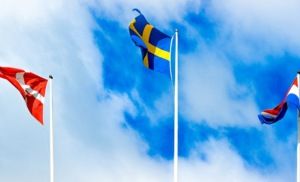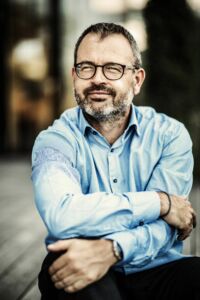Opinion
The Valley of Life: Stockholm and Copenhagen – let bygones be bygones!
Søren Bregenholt
This article is more than 7 years old.

Let’s move that Swedish flag back to the left (photo; Jonatan Svensson Glad)
The race to attract the European Medicines Agency after Brexit has divided Stockholm and Copenhagen for more than a year, with both cities competing intensively to be the new host.
Eventually, both Denmark and Sweden lost, and the attractive EU agency will now move to Amsterdam. Not a bad choice from a European perspective, but without any substantial established pharmaceutical or biotech industry, the choice of the Dutch city was probably more a politically and administratively convenient choice, especially when looking at it from an industry and R&D perspective.
A top three bid
Copenhagen was among the top three candidates, as has been pointed out in several analyses and independent reports. That Copenhagen made it that far can certainly to a significant extent be attributed to the Medicon Valley perspective and the critical mass resulting from the strengthened collaboration with southern Sweden.
However, the inability to create a joint Danish-Swedish-Scandinavian alliance behind the Copenhagen-based candidacy created a tripwire for the effort to beat Amsterdam and Milan. Whether this lack of joint support eventually proved decisive, we will never know, but hopefully the process has provided the two governments with the foresight to strengthen collaboration in the future.
Learning bilaterally
From a Medicon Valley perspective, I am grateful for the local south Swedish support for the official Danish candidacy. It underpins the strength of our life science cluster and gives us hope for the future development of the region.
It is also my hope that Copenhagen and Stockholm will now let bygones be bygones. We must work harder and collaborate even more to realise our shared vision of a world-class Danish-Swedish life science cluster, as it requires support from both countries, regionally as well as nationally.
Raising our profile
As a positive side-effect, the race for the EMA has highlighted the strengths and strongholds of Medicon Valley globally, and consequently global companies have become curious to know more about the potential of our life science cluster.
So, my appeal to Stockholm and Copenhagen is this: let’s use the momentum created, reunite together, and get back in the saddle as soon as possible!

About
Søren Bregenholt
As the chairman of the Medicon Valley Alliance – the gold-labelled Danish-Swedish life science cluster organisation – Søren will address current trends and challenges in the sector. Away from the alliance, he is responsible for Novo Nordisk’s global R&D-based PhD and post doc programs, as well as research, innovation and educational policy.










































